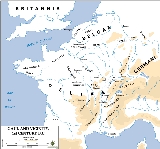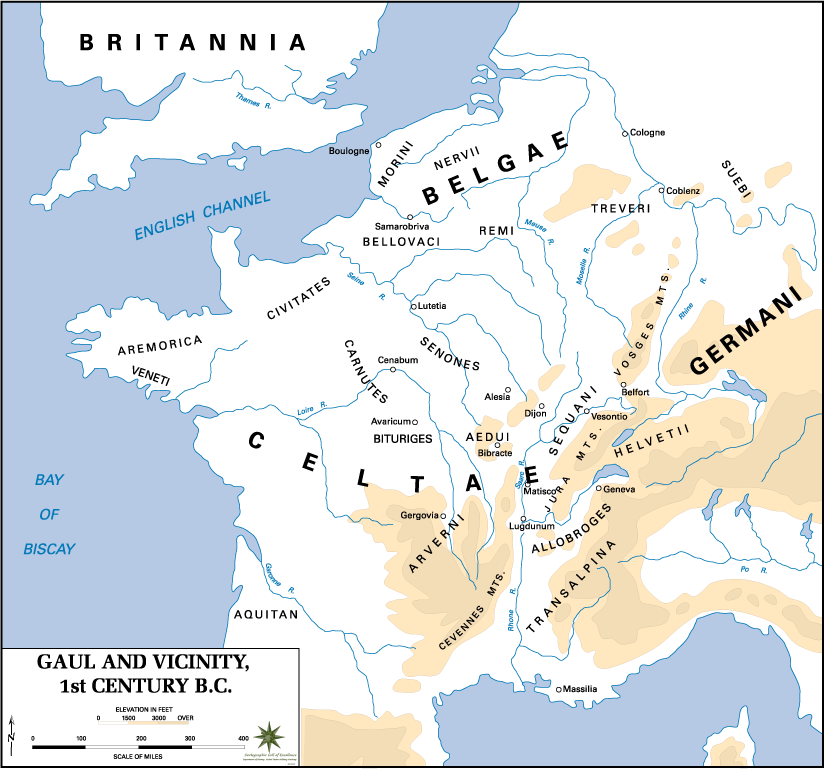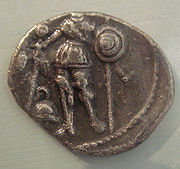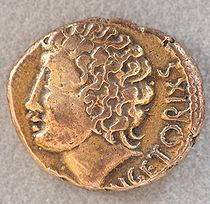
Arverni
Encyclopedia


Gauls
The Gauls were a Celtic people living in Gaul, the region roughly corresponding to what is now France, Belgium, Switzerland and Northern Italy, from the Iron Age through the Roman period. They mostly spoke the Continental Celtic language called Gaulish....
tribe living in what is now the Auvergne
Auvergne (région)
Auvergne is one of the 27 administrative regions of France. It comprises the 4 departments of Allier, Puy de Dome, Cantal and Haute Loire.The current administrative region of Auvergne is larger than the historical province of Auvergne, and includes provinces and areas that historically were not...
region of France
France
The French Republic , The French Republic , The French Republic , (commonly known as France , is a unitary semi-presidential republic in Western Europe with several overseas territories and islands located on other continents and in the Indian, Pacific, and Atlantic oceans. Metropolitan France...
during the last centuries BC. One of the most powerful tribes in ancient Gaul
Gaul
Gaul was a region of Western Europe during the Iron Age and Roman era, encompassing present day France, Luxembourg and Belgium, most of Switzerland, the western part of Northern Italy, as well as the parts of the Netherlands and Germany on the left bank of the Rhine. The Gauls were the speakers of...
, they opposed the Romans
Ancient Rome
Ancient Rome was a thriving civilization that grew on the Italian Peninsula as early as the 8th century BC. Located along the Mediterranean Sea and centered on the city of Rome, it expanded to one of the largest empires in the ancient world....
on several occasions. Their most important stronghold was Gergovia, near the present-day commune of Clermont-Ferrand
Clermont-Ferrand
Clermont-Ferrand is a city and commune of France, in the Auvergne region, with a population of 140,700 . Its metropolitan area had 409,558 inhabitants at the 1999 census. It is the prefecture of the Puy-de-Dôme department...
.
Early history
The Arverni had once been the most powerful tribal hegemony in Gaul during the 3rd and 2nd centuries BC under their king, Luernios, but when his son (or grandson) BituitusBituitus
Bituitus was a king of the Arverni, a Gallic tribe living in what is now the Auvergne region of France. The Arverni were a powerful opponent of the Roman Republic during the 3rd and 2nd centuries under the leadership of Luernios, the father of Bituitus...
was defeated by the Romans
Ancient Rome
Ancient Rome was a thriving civilization that grew on the Italian Peninsula as early as the 8th century BC. Located along the Mediterranean Sea and centered on the city of Rome, it expanded to one of the largest empires in the ancient world....
in 121 BC, their ascendancy passed to the Aedui
Aedui
Aedui, Haedui or Hedui , were a Gallic people of Gallia Lugdunensis, who inhabited the country between the Arar and Liger , in today's France. Their territory thus included the greater part of the modern departments of Saône-et-Loire, Côte-d'Or and Nièvre.-Geography:The country of the Aedui is...
and Sequani
Sequani
Sequani, in ancient geography, were a Gallic people who occupied the upper river basin of the Arar , the valley of the Doubs and the Jura Mountains, their territory corresponding to Franche-Comté and part of Burgundy.-Etymology:...
. Unlike the Allobroges
Allobroges
The Allobroges were a Celtic tribe of ancient Gaul, located between the Rhône River and the Lake of Geneva in what later became Savoy, Dauphiné, and Vivarais. Their cities were in the areas of modern-day Annecy, Chambéry and Grenoble, the modern of Isère, and modern Switzerland...
, who were brought under direct Roman rule as a result of the Celtic wars of the 120s, the Arverni negotiated a treaty that preserved their independence, though their territory was diminished. No further Arvernian kings are mentioned in the historical record, and they may have adopted a constitutional oligarchy
Oligarchy
Oligarchy is a form of power structure in which power effectively rests with an elite class distinguished by royalty, wealth, family ties, commercial, and/or military legitimacy...
at this time. However, there were at least two later attempts to re-establish rulership. The defeat of the Arverni led directly to the establishment of Gallia Narbonensis
Gallia Narbonensis
Gallia Narbonensis was a Roman province located in what is now Languedoc and Provence, in southern France. It was also known as Gallia Transalpina , which was originally a designation for that part of Gaul lying across the Alps from Italia and it contained a western region known as Septimania...
as a Roman province
Roman province
In Ancient Rome, a province was the basic, and, until the Tetrarchy , largest territorial and administrative unit of the empire's territorial possessions outside of Italy...
, referred to simply as the Provincia so often that a part of the ancient region is today known as Provence
Provence
Provence ; Provençal: Provença in classical norm or Prouvènço in Mistralian norm) is a region of south eastern France on the Mediterranean adjacent to Italy. It is part of the administrative région of Provence-Alpes-Côte d'Azur...
.
The King Luernios was mentioned in writing by the Greek ethnographer Posidonius. Luernios was known to have scattered gold and silver coins to his followers while riding in his chariot. Under Luernios, the Arverni was at the head of a formidable Gallic military hegemony which stretched from the Rhine to the Atlantic coast.
Gallic Wars

Gallic Wars
The Gallic Wars were a series of military campaigns waged by the Roman proconsul Julius Caesar against several Gallic tribes. They lasted from 58 BC to 51 BC. The Gallic Wars culminated in the decisive Battle of Alesia in 52 BC, in which a complete Roman victory resulted in the expansion of the...
of Julius Caesar
Julius Caesar
Gaius Julius Caesar was a Roman general and statesman and a distinguished writer of Latin prose. He played a critical role in the gradual transformation of the Roman Republic into the Roman Empire....
from 58 BC to 51 BC. At first the Arvenian nobles tried to avoid confronting Caesar during his early incursions. They executed the leader Celtillus, evidently for trying to gain sovereignty over all the Gauls. In 52 BC, Celtillus' son Vercingetorix
Vercingetorix
Vercingetorix was the chieftain of the Arverni tribe, who united the Gauls in an ultimately unsuccessful revolt against Roman forces during the last phase of Julius Caesar's Gallic Wars....
rallied his supporters to fight the Romans, but was expelled from Gergovia by the nobles, including his uncle Gobanitio. He then raised a great army in the country, and returned to the city where he ejected his opponents and was declared king. This accomplished, Vercingetorix forged an alliance with many other Gallic tribes, and led them in the last significant Gallic offensive against the Romans. Vercingetorix was defeated by Caesar at the Battle of Alesia
Battle of Alesia
The Battle of Alesia or Siege of Alesia took place in September, 52 BC around the Gallic oppidum of Alesia, a major town centre and hill fort of the Mandubii tribe...
, after which he surrendered. The Arveni territories were subsequently incorporated into the Roman imperium.
See also
- Quintus Fabius Maximus AllobrogicusQuintus Fabius Maximus AllobrogicusQuintus Fabius Maximus Allobrogicus, was a Roman statesman and general.Fabius Maximus Allobrogicus, a member of the patrician gens Fabia, was the son of Quintus Fabius Maximus Aemilianus, consul of 145 BC...
: conquered King Bituitus - Alba FucensAlba FucensAlba Fucens was an ancient Italic town occupying a lofty situation at the foot of the Monte Velino, c. 6.5 km north of Avezzano, Abruzzo, central Italy. Its remains are today in the comune of Massa d'Albe....
: town where Bituitus was held after capture

